- Sermons
- /
- Friday Sermons
The reality of the worldly life and the Hereafter in the Noble Quran:
Dear brother, sometimes man needs to know about issues which contain the minute details about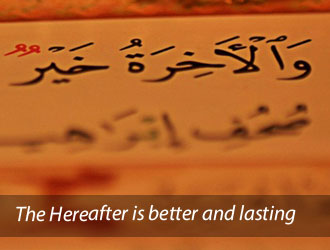 Islam, but in other times he needs to know about topics which tackle most of the general issues.
Islam, but in other times he needs to know about topics which tackle most of the general issues.We live in the worldly life, and Allah the Almighty tells us that after this life there is the Hereafter. This leads us to the subject of our Khutbah today: What is the reality of the worldly life as it is mentioned in the Noble Quran? What is the reality of the Hereafter as it is mentioned in the Noble Quran? Almighty Allah describes the worldly life as very short, and as a limited enjoyment; He says:
(And on the Day that the Hour will be established, the Mujrimun (criminals, disbelievers, polytheists, sinners, etc.) will swear that they stayed not but an hour,)
Mathematically, suppose that the distance between the earth and the sun is a very huge number; let us say No. 1 is in the earth and the rest of the distance is full of zeros. Every other millimeter there is zero, can you imagine this number? If this number reflects decimal fraction which equals infinity, then it is valueless. Similarly is the worldly life; it is nothing in comparison to the Hereafter. Allah says in the Noble Ayah:
(And on the Day that the Hour will be established, the Mujrimun (criminals, disbelievers, polytheists, sinners, etc.) will swear that they stayed not but an hour,)
Some definitions of the worldly life in the Book of Allah the Exalted:
1- The worldly life is short and a limited enjoyment:
How could you sacrifice the everlasting for a short period of time that is full of trouble?
Here is another Ayah:
(Say: "Short is the enjoyment of this world.)
Almighty Allah tells us that the worldly life is short:
(The Hereafter is (far) better for him who fears Allah, and you shall not be dealt with unjustly even equal to the Fatila (a scalish thread in the long slit of a date-stone.)
Thus, the worldly life is short and its enjoyment is limited:
(Say: "Short is the enjoyment of this world.)
2- It is the abode of amusement and play, pomp and boasting:
There is another definition of the worldly life as it is mentioned in the Noble Quran.
It is only amusement and play, pomp and boasting:
(Know that the life of this world is only play and amusement, pomp and mutual boasting among you, and rivalry in respect of wealth and children)
This is the Word of Lord of the World, the Creator of universe:
((The superiority of the Qur'an over the rest of words, is like the superiority of Allah over His creations.))
We are informed by Allah.
3- It is the abode of deception:
In the third definition the worldly life is defined as the abode of deception. Whatever is deceptive has a huge size, but its reality is completely the opposite; it is very small. Almighty Allah says: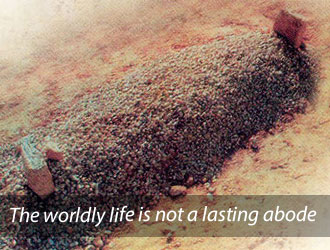
(...let not then this (worldly) present life deceive you, nor let the chief deceiver (Satan) deceive you about Allah.)
Almighty Allah says:
(O mankind! Verily, the Promise of Allah is true. So let not this present life deceive you, and let not the chief deceiver (Satan) deceive you about Allah.)
This is the third definition.
4- It is the abode of luxuries and enjoyments:
According to the fourth definition, the worldly life is the abode of luxuries and enjoyments which Allah grants to those who He loves and who He does not love. It is perishable goods which are granted to all kinds of people; the righteous and the dissolute eat from it, while the Hereafter is a true promise, and it is ruled by a Just King. Allah the Almighty says:
(And the chiefs of his people, who disbelieved and denied the Meeting in the Hereafter,)
Pay attention to the following:
(who disbelieved and denied the Meeting in the Hereafter,)
In eight Ayat, al-Kufr is connected to the luxuries, not the moderate spending. Let me repeat: Al-Kufr is mentioned in connection with the luxuries in eight Ayat in Allah's Book:
(And the chiefs of his people, who disbelieved and denied the Meeting in the Hereafter, and to whom We had given the luxuries and comforts of this life, said: "He is no more than a human being like you, he eats of that which you eat, and drinks of what you drink.)
5- It is the abode of temptation:
In another definition, the worldly life is the abode of temptation. It is the very place where Shaytan plots and tries enviously to tempt man with the sensual lusts and desires. His temptation works with those who are not devoted servants to Allah. Almighty Allah says:
("Certainly, you shall have no authority over My slaves…)
Shaytan has authority only over those who are not Allah's sincere servants. Almighty Allah says:
([Iblis (Satan)] said: "See? This one whom You have honoured above me, if You give me respite (keep me alive) to the Day of Resurrection, I will surely seize and mislead his offspring (by sending them astray) all but a few!"* (Allah) said: "Go, and whosoever of them follows you, surely! Hell will be the recompense of you (all) an ample recompense* "And Istafziz [literally means: befool them gradually] those whom you can among them with your voice (i.e. songs, music, and any other call for Allah's disobedience), make assaults on them with your cavalry and your infantry, mutually share with them wealth and children (by tempting them to earn money by illegal ways usury, etc., or by committing illegal sexual intercourse, etc.), and make promises to them." But Satan promises them nothing but deceit.)
This indicates that the worldly life (as a place and as a time) are two situations where Shaytan tempts Adam's son. This is one of the characteristics of the worldly life.
6- It is the abode of aberrance and transgression:
Also, the worldly life is an abode of aberrance and transgression to whoever is seduced by it. Allah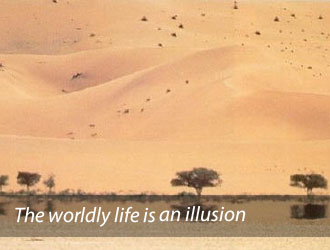 the Exalted says:
the Exalted says:("Those whose efforts have been wasted in this life while they thought that they were acquiring good by their deeds!)
(Then, for him who Tagha (transgressed all bounds, in disbelief, oppression and evil deeds of disobedience to Allah)* And preferred the life of this world (by following his evil desires and lusts),* Verily, his abode will be Hell-fire;)
7- It is the abode of disgrace and curse for those who turn away from Allah:
The seventh definition as it is mentioned in the Noble Quran is that the worldly life is the abode of disgrace and curse for those who turn away from Allah. Almighty Allah says:
(So Allah made them to taste the disgrace in the present life, but greater is the torment of the Hereafter if they only knew!)
(And We made a curse to follow them in this world, and on the Day of Resurrection, they will be among Al-Maqbuhun (those who are prevented to receive Allah's Mercy or any good, despised or destroyed, etc.).)
8- It is the abode of gaining Hasanat (rewards) for whoever believes and does good deeds:
The eighth Quranic definition is that the worldly life is the abode of gaining Hasanat (rewards) and having a good life for whoever believes and does good deeds:
(Say (O Muhammad PBUH): "O My slaves who believe (in the Oneness of Allah Islamic Monotheism), be afraid of your Lord (Allah) and keep your duty to Him. Good is (the reward) for those who do good in this world, and Allah's earth is spacious (so if you cannot worship Allah at a place, then go to another)! Only those who are patient shall receive their rewards in full, without reckoning.")
Thus, it is the abode of gaining Hasanat (rewards) and having a good life as it is mentioned in the following Ayah:
(Whoever works righteousness, whether male or female, while he (or she) is a true believer (of Islamic Monotheism) verily, to him We will give a good life (in this world with respect, contentment and lawful provision),)
This is the promise of Allah. Terminating the universe is easier to Allah than to not fulfill His promises to the believers:
(and We shall pay them certainly a reward in proportion to the best of what they used to do (i.e. Paradise in the Hereafter).)
9- It is the abode of tests:
The ninth Quranic definition is that it is the abode of tests:
(Blessed is He in Whose Hand is the dominion, and He is Able to do all things* Who has created death and life, that He may test you which of you is best in deed.)
(Verily! We have made that which is on earth as an adornment for it, in order that We may test them (mankind) as to which of them are best in deeds. [i.e. those who do good deeds in the most perfect manner, that means to do them (deeds) totally for Allah's sake and in accordance to the legal ways of the Prophet PBUH].)
There are nine definitions of the worldly life mentioned in Allah's Book, so who is the believer? He is the one who believes in Allah's Word, whose views of the worldly life matches what is mentioned in the Noble Quran, who believes that the worldly life is the mount for the Hereafter and who believes that the worldly life is the abode of striving and fulfilling assignments and the Hereafter is the abode of honoring.
Thinking of the worldly life according to the Quran is success:
Dear brother, we are informed about the reality of the worldly life by the Creator of the universes. Who is the most mistaken man? He is the one who visualizes the worldly life in a way that contradicts these definitions. He thinks that it is a big booty, and that both the rich and the powerful are very happy in it. As a believer, your heroism lies in making your views about the worldly life in accordance to its description in the Noble Quran:
(Say: "Short is the enjoyment of this world.)
Sometimes the bounty of wealth, the good health, the prestigious social position and the power depend on having a living heart; when the heart stops beating, everything is over. The money you own is not yours, and you will lose your education one day. All the things that you boast about are worthless the minute you leave the worldly life.
Dear brother, let me repeat what I have said at the beginning of our lesson: We need to know about the minute details of our religion to enrich our basic thoughts, but also we are in dire need of knowing about the general things, such as the reality of the universe, the worldly life, the Hereafter and man.
The worldly life is the abode of striving and of affliction:
The Hereafter, on the other hand, is the abode of calling to account. Thus, the worldly life is the abode of striving and affliction, whereas the Hereafter is the abode of calling to account. In the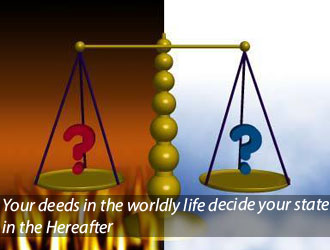 Hereafter man receives the result of this affliction; he receives either the punishment or the reward for his deeds:
Hereafter man receives the result of this affliction; he receives either the punishment or the reward for his deeds:(So whosoever does good equal to the weight of an atom (or a small ant), shall see it* And whosoever does evil equal to the weight of an atom (or a small ant), shall see it.)
((A Bedouin said to the Prophet, may Allah have peace and blessings upon him, "O Allah's Messenger, advise me and let your advise be brief." Then the Prophet, may Allah have peace and blessings upon him, reauthord Allah's Saying: (So whosoever does good equal to the weight of an atom (or a small ant), shall see it* And whosoever does evil equal to the weight of an atom (or a small ant), shall see it.)[Al-Zalzalah:7-8]. The Bedouin said, "this is enough for me."))
The Hereafter is the staying abode:
(Verily, the home of the Hereafter, that is the life indeed (i.e. the eternal life that will never end), if they but knew.)
The Hereafter:
Ibn Mandhoor, the author of Lisan al-Arab, says: "Life is the word which refers to all living things". Almighty Allah calls the Hereafter 'the life indeed', because it is the real life which is everlasting; where there is no death, misery nor hardships. All the hardships of the worldly life ends when death comes. Unlike the worldly life, the Hereafter has things 'that no eye has seen, or ear has heard, or that haven’t crossed the mind of any human being'.
Some scholars say that 'whoever moves to the Hereafter is not dead'. Whoever moves to the Hereafter never dies in it, so whoever enters Paradise lives a good life, and whoever enters Paradise, is the successful one, because the worldly life is the enjoyment of deception. The destiny of whoever enters Hellfire is described by Almighty Allah:
(Wherein he will neither die (to be in rest) nor live (a good living).)
The hardest life one can ever live is to be neither with the dead, so that you rest, nor with the living, so that you are happy:
(Wherein he will neither die (to be in rest) nor live (a good living).)
Similarly, the hardest situation the Ummah can be in is neither in peace nor in war. It is not totally in peace, so she cannot work, nor is it in war, so it cannot be victorious. She is neither in war nor in peace, and this is the situation the enemies of Ummah want her to stay in.
Some definitions of the Hereafter:
1- The Hereafter is the real life:
Dear brother, the Hereafter as it is described in the Noble Quran is real life:(O you who believe! Answer Allah (by obeying Him) and (His) Messenger when he (PBUH) calls you to that which will give you life,)
you to that which will give you life,)
It is the eternal life which suits us; suits man who is the foremost creature. Also, it is the life which Allah intends to be for us, the one for which we were created and it is the eternal life which man will be happy in, because he is beside the One, the Mighty Ruler. This is indeed the life:
(Verily, the home of the Hereafter, that is the life indeed (i.e. the eternal life that will never end), if they but knew.)
2- The Hereafter is the home that will remain forever:
It is the home that will remain forever:
("O my people! Truly, this life of the world is nothing but a (quick passing) enjoyment,)
The worldly life is a temporary enjoyment that comes to an end:
(and verily, the Hereafter that is the home that will remain forever.")
Suppose that someone has to work in a country other than his for one year, so he lives temporarily in any house. After he finishes the mission in that country, he will live in a good house. Hence, the Hereafter is the life indeed and the real one where there is no death, illness, undutiful child, bad wife, little income or oppressing tyrant:
(Verily, the home of the Hereafter, that is the life indeed (i.e. the eternal life that will never end), if they but knew.)
It is the home that will remain forever:
(Say: "Short is the enjoyment of this world. The Hereafter is (far) better for him who fears Allah,)
3- The Hereafter is better than the worldly life for those who fear Allah:
It is better than the worldly life for those who fear Allah. Listen to Allah's advice:
(But far better is the house in the Hereafter for those who are Al-Muttaqun. Will you not then understand?)
(Say: "Short is the enjoyment of this world. The Hereafter is (far) better for him who fears Allah,)
4- The Hereafter is the abode of torment for the disbelievers:
The Hereafter is the abode of torment for the disbelievers: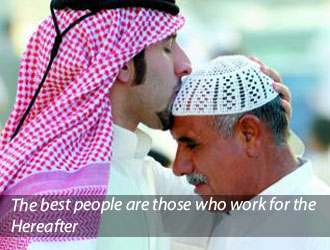 (They are those for whom there will be an evil torment (in this world). And in the Hereafter they will be the greatest losers.)
(They are those for whom there will be an evil torment (in this world). And in the Hereafter they will be the greatest losers.)
The hero is the one who laughs in the Hereafter, not in the worldly life:
(But this Day (the Day of Resurrection) those who believe will laugh at the disbelievers.)
(Verily! There was a party of My slaves, who used to say: "Our Lord! We believe, so forgive us, and have mercy on us, for You are the Best of all who show mercy!"* But you took them for a laughingstock, so much so that they made you forget My Remembrance while you used to laugh at them!* Verily! I have rewarded them this Day for their patience, they are indeed the ones that are successful.)
Here is another Ayah:
(But this Day (the Day of Resurrection) those who believe will laugh at the disbelievers.)
I repeat: Your heroism is represented by laughing at the end (in the Hereafter), not at the beginning (in the worldly life):
(They are those for whom there will be an evil torment (in this world). And in the Hereafter they will be the greatest losers.)
(and a great torment is theirs in the Hereafter.)
5- The Hereafter is the abode where the ranks of people vary:
Almighty Allah says:
(No doubt, in the Hereafter, they will be the losers.)
Since the Creator of universes says about whoever strays from obeying Him that he is a loser, then he is absolutely a loser. Just think about it, did Allah honor or humiliate Muhammad, may Allah have peace and blessings upon him, when He kept the worldly life from him? If we say that He humiliated him, we are mistaken, and if we say that He honored him, this indicates that He humiliates other people if He grants them the bounty of the worldly life. I mean that people who are given the bounty of the worldly life are humiliated if they use this bounty in disobeying Allah. Allah the Exalted praises the rich believer in many Ayat and As7adeth. The money he is granted is a source of power for him, and he uses it to do good deeds.
The ranks of people not only vary in the worldly life, but also in the Hereafter:
(See how We prefer one above another (in this world)…)
This ayah is very precise; it shows how people are preferred one above another. There are so many examples concerning this point. You can notice the difference between someone who lives in a house that costs 200. 000.000 liras, and another one who lives in a house that costs 600.000 liras. You can also see the difference between the man who lives in the most prestigious quarter in Damascus in a house which costs 200. 000.000 liras, and a person who lives in house that is located in the outskirts of the city, and it consists of one room only with no heating, good light nor drinking water. The difference can be very big, such as the one between a soldier and the chief of staff, between the nurse who removes the dirt from the patient and the cardiologist, between a professor and a teacher who teaches in a village and between a recruit and a chief of staff. There is a huge gap between those people. Read this Ayah, please:
(See how We prefer one above another (in this world)…)
They are preferred one above another in this world, but the amazing fact is:
(See how We prefer one above another (in this world) and verily, the Hereafter will be greater in degrees and greater in preference.)
If the difference between the rich and poor, between the well-known scientist and the ignorant man and between the strong man and the weak one is very huge, the disparity between the degrees of people in the Hereafter is much greater than the one in the worldly life:
(See how We prefer one above another (in this world) and verily, the Hereafter will be greater in degrees and greater in preference.)
6- The Hereafter is the abode of responsibility and calling to account:
The Hereafter is the abode of responsibility and calling to account. You are given the free will in the worldly life; you can either pray or not, give charity or not and do good deeds or bad ones. Thus, you are granted the free will. The worldly life is the abode of striving and affliction, whereas the Hereafter is the abode of responsibility and calling to account:
are granted the free will. The worldly life is the abode of striving and affliction, whereas the Hereafter is the abode of responsibility and calling to account:(So, by your Lord (O Muhammad PBUH), We shall certainly call all of them to account* For all that they used to do.)
By Allah, whoever shed and will shed one single drop of blood on earth since the day Adam was created till the Day of Resurrection, will be punished severely for it. Some scholars said, "Except the blood of whoever is killed by Had (legal punishment), because Almighty Allah is responsible for it." It is unacceptable to say that one hundred people were mistakenly killed by bombing, or say that they were unintentionally killed. The issue is clear:
(So, by your Lord (O Muhammad PBUH), We shall certainly call all of them to account* For all that they used to do.)
(and leave the company of those who belie or deny (or utter impious speech against) His Names. They will be requited for what they used to do.)
In the Hereafter man is responsible for all his deeds of the worldly life:
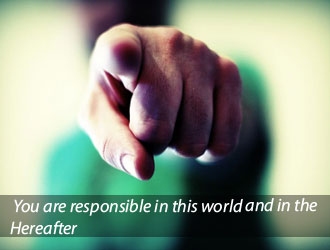 Dear brother, man is responsible in the Hereafter for all what he does in the worldly life; he will be asked about the minute details of all the trials of the worldly life. What is the trial? It is whatever Allah grants you, and whatever He deprives you of. Your children are one of the trials; have you raised them up according to the Islamic teachings? Have you made them acquainted with Allah? In case you are sterile, what do you do then? You are responsible for whatever you are granted and whatever you are deprived of. It is reported in one of the wonderful Du'a of the Prophet, may Allah have peace and blessings upon him:
Dear brother, man is responsible in the Hereafter for all what he does in the worldly life; he will be asked about the minute details of all the trials of the worldly life. What is the trial? It is whatever Allah grants you, and whatever He deprives you of. Your children are one of the trials; have you raised them up according to the Islamic teachings? Have you made them acquainted with Allah? In case you are sterile, what do you do then? You are responsible for whatever you are granted and whatever you are deprived of. It is reported in one of the wonderful Du'a of the Prophet, may Allah have peace and blessings upon him:
((O Allah, whatever you have provided me of that which I love, then make it strength for me for that which You love. O Allah, and what you have kept from me of that which I love then make it for me a period of rest in that which You love.))
You are between two situations: If you are granted whatever you love, let it be in the Cause of Allah. Listen to the proof in the following Ayah:
(But seek, with that (wealth) which Allah has bestowed on you, the home of the Hereafter, and forget not your portion of legal enjoyment in this world,)
Seek the Hereafter with your knowledge, wealth and position:
(But seek, with that (wealth) which Allah has bestowed on you, the home of the Hereafter, and forget not your portion of legal enjoyment in this world, and do good as Allah has been good to you, and seek not mischief in the land.)
Dear brother, in the worldly life you may escape the punishment for your deeds. Well, this is possible; there were tyrants who killed many of their people, and when they died, their death was celebrated. Out of the wisdom intended by Allah, you may escape Allah's punishment in the worldly life, but in the Hereafter:
(So, by your Lord (O Muhammad PBUH), We shall certainly call all of them to account* For all that they used to do.)
The responsibility of man:
Dear brother, man is responsible in the worldly life; first of all he is responsible for himself, for his knowledge, what did he do with it? For his wealth, how did he get it, and how did he spend it? For his position, family, children, wife, parents, kinship and even his Ummah. How is he responsible for his Ummah? Well, have you chosen a specialty that benefits your Ummah, or corrupts its youths? Someone may be responsible for corrupt acts which ruin the young men and women. You, as a young man, are responsible for your Ummah, and it is responsible for you too; did we give you your rights? did we help you to keep your dignity, or did we humiliate you by giving you a little income which does not suffice you? The ruler is responsible for those whom he rules, the strong is responsible for the weak, the rich is responsible for the poor and every generation is responsible for the successive ones; did this generation leave for the other generations knowledge or bad arts?Responsibility is very wide; this Ummah is responsible for the other ones. Almighty Allah has made us intermediaries between ourselves and His creations; have we transmitted the real Islam, or have we distorted its image before sh3er? Man is responsible for other creatures, because he is the Khalifah (vicegerent) of Allah on earth:
((All creatures are Allah's dependants, and the most loved ones by Him are the most helpful to His dependants.))
In the Hereafter everyone is responsible for his own deeds:
(And that man can have nothing but what he does (good or bad)* And that his deeds will be seen* Then he will be recompensed with a full and the best recompense.)
For this reason, it is reported in some of the sound As7adeth:
((Whosoever introduces a good practice in Islam, there is for him its reward and the reward of those who act upon it after him without anything being diminished from their rewards. And whosoever introduces an evil practice in Islam, will shoulder its sin and the sins of all those who will act upon it, without diminishing in any way their burden.))
Types of trials:
Dear brother, we have tackled so far the reality of the worldly life and the reality of the Hereafter as they are mentioned in the Noble Quran. Man must go through trials in the worldly life, and he must be tested. There are the trials of shubuhat (the singular is shubuhah. They are things of doubtful benefit and permissibility); when you are confused about the religious issues. For instance, you may think that a shubuhah is an act of obedience, while it is not, or you may think that an act of obedience is shubuhah, whereas it is not. Man should seek Islamic knowledge to avoid this confusion between shubuhat and acts of obedience. This is called the trial of shubuhat, which is related to the Creed.
There is another type of the trials; it is the trial of lusts. Sometimes man is defeated by his lusts. He may be defeated by two types of trials; he is defeated by the trial of shubuhat when he mistakenly thinks that there is no problem at all with usurious loan, and he is defeated by the trial of lusts when he thinks that his illicit affair is acceptable. The trial of shubuhat results from the lack of insight and Islamic knowledge; these things are negatively affected by the intentional corruption and following one's desires. This type of trial leads to Kufr and hypocrisy. It is the trial of hypocrites and innovators. Moreover, it is the outcome of corrupted comprehension, incorrect reporting, corrupting purpose, followed desires, blind insight and ruined will. None can escape this trail unless he who acts upon Allah's Method.
The trial of lusts, on the other hand:
(Like those before you, they were mightier than you in power, and more abundant in wealth and children. They had enjoyed their portion awhile, so enjoy your portion awhile as those before you enjoyed their portion awhile;)
It means that they enjoyed their portion in the worldly life and its lusts:
(They had enjoyed their portion awhile, so enjoy your portion awhile as those before you enjoyed their portion awhile; and you indulged in play and pastime (and in telling lies against Allah and His Messenger Muhammad PBUH as they indulged in play and pastime.)
This indulgence in falsehood is one of shubuhat, and Almighty Allah mentions in this Ayah the effect of this indulgence which is manifested in the corruption of Deen, behavior and false beliefs, and in acting upon things that contradict Sunnah.
Dear brother, let me put it like this: The first type of corrupting shubuhat is the innovations and desires, and the second type is lusts and bawdry of deeds.
Avoiding subuhat and lusts:
Dear brother, beware of whoever follows his desires; whose desires are made as a trial, and be beware of whoever indulges in the worldly life and is blinded by it.
Almighty Allah says:
(And We have made some of you as a trial for sh3er: will you have patience? And your Lord is Ever All-Seer (of everything).)
Dear brother, shubuhat can be get rid of by believing with certainty, and lusts can be avoided by patience:
(And We made from among them (Children of Israel), leaders, giving guidance under Our Command, when they were patient and used to believe with certainty in Our Ayat (proofs, evidences, verses, lessons, signs, revelations, etc.).)
Dear brother, trials and afflictions, the reality of the worldly life and the reality of the Hereafter are general topics in Deen and we will go on discussing them in the next Khutab insha' Allah. I say my words, and I ask the Forgiveness of Allah, the Most Great, for me and for you. Dear brother, ask His Forgiveness, so that you will be forgiven, as those who are forgiven will be the successful ones.
* * *
2nd Khutbah:
Praise be to Allah, Lord of the Worlds, and I bear witness that there is no deity worthy of worship except Allah; the Protector of the righteous. And I bear witness that our Master Muhammad, may Allah have peace and blessings upon him, is His Servant and Messenger the one with noble morals. May Allah's peace and blessings be upon him, his Folks and Companions.
Knowing the crucial issues of life leads to happiness:
Dear brother, there are issues which are considered crucial; the way you understand and comprehend them determines your everlasting destiny. In other words, these issues are dangerous.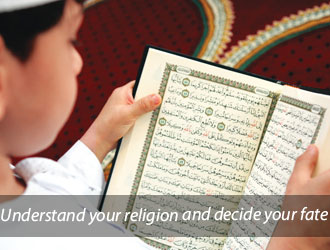 Unlike them, other issues are not considered decisive. For example, the house, where you live, may be small or big, and may be expensive or cheap; whatever it is, it does not determine your destiny. Your Creed, on the other hand, and your proper understanding or misunderstanding of the religion are very essential issues since they determine your destiny. Thus, your heroic act is to know the decisive issues in your life. These issues cannot be postponed or played with. Some of the issues which determine your destiny are: The proper understanding of your religion and knowing your rights on Allah and Allah's rights on you.
Unlike them, other issues are not considered decisive. For example, the house, where you live, may be small or big, and may be expensive or cheap; whatever it is, it does not determine your destiny. Your Creed, on the other hand, and your proper understanding or misunderstanding of the religion are very essential issues since they determine your destiny. Thus, your heroic act is to know the decisive issues in your life. These issues cannot be postponed or played with. Some of the issues which determine your destiny are: The proper understanding of your religion and knowing your rights on Allah and Allah's rights on you.Dear brother, I beseech Almighty Allah that when one of us seeks Islamic knowledge, the purpose behind that should be to choose the destiny of man which is intended by Allah, not to boast about this knowledge. Almighty Allah wants you to be guided and to worship Him, so that you will be pleased by this worship in the worldly life and the Hereafter. Also, Almighty Allah wants Paradise to be your abode, because you were created to be there; Allah wants you to live in everlasting happiness. These issues which are discussed in the Friday sermons are related to our eternal destiny.
Du'a:
O Allah, we beseech You to show us the way of righteousness together with those to whom You showed it; and to give us good health together with those whom You have healed; and to be our Protector, as You are of those whom You protect; and to bless what You have bestowed on us; and to save us from the affliction that You have decreed –for You rule with justice and You are never judged. He whom You protect shall never be humiliated, and he whom You make Your enemy shall never be elevated, blessed and dignified are You. We thank You for what You have decreed, we ask You for Forgiveness for our sins, and we repent to You.
O Allah, please lead us to the good deeds, for no one leads to them but You; please lead us to the good conduct, for no one leads to it but You; please make us do well in the Deen, which is our dignity, make us do well in our worldly life, in which we dwell and grant us safety on the Day of Judgment, for it is our Final Destination. O Allah, please supply our life with all good things and make our death a rest from every evil.
O our Master, the Lord of all Worlds, please make use desire what You have made lawful and reject what You have made unlawful, make us obedient to You and turn us away from our disobedience and make us by Your benevolence independent of all sh3er.
O Allah, by Your Mercy and Benevolence, raise high the word of truth and this religion, grant triumph to Islam, dignify Muslims and grant triumph to Muslims all around the world. O Allah, show us Your Omnipotence against Your enemies, You are the Most Generous.










